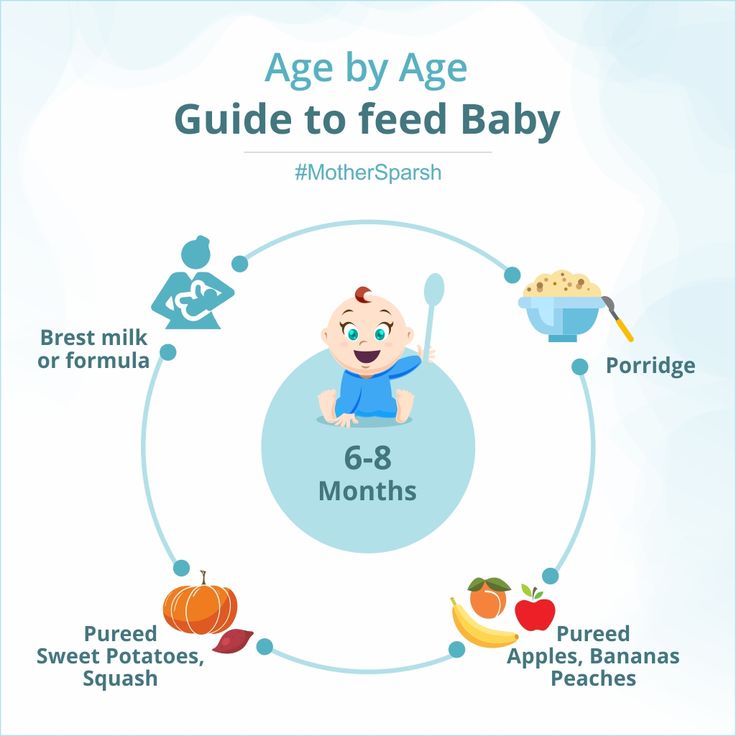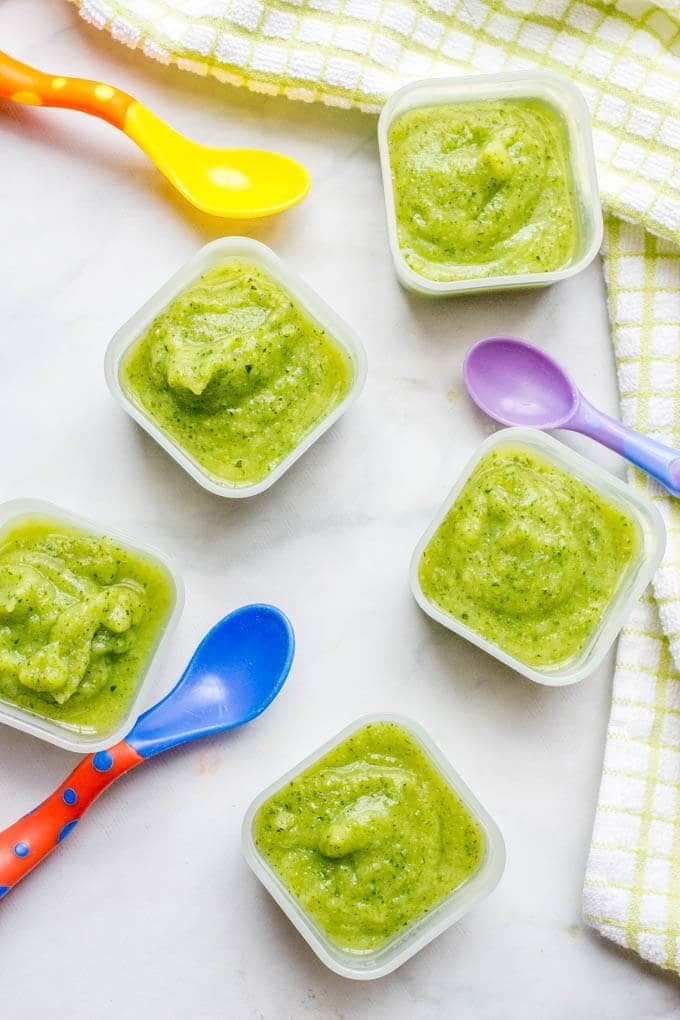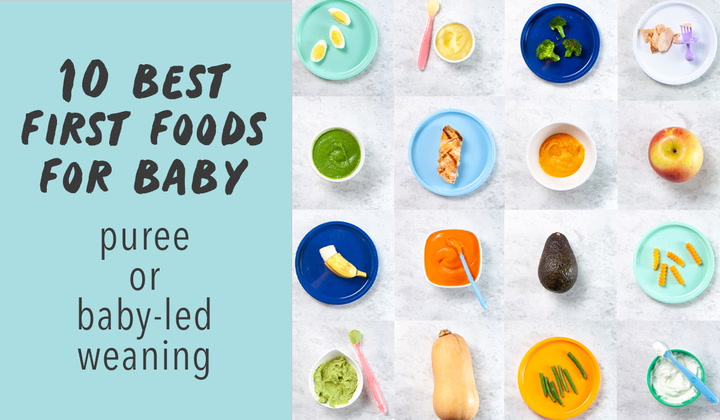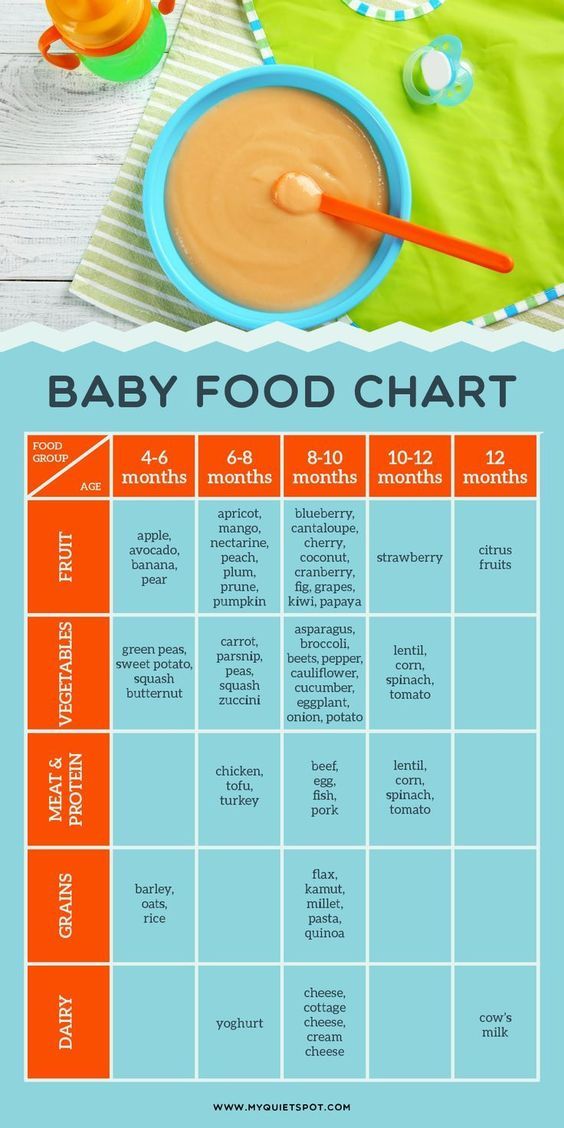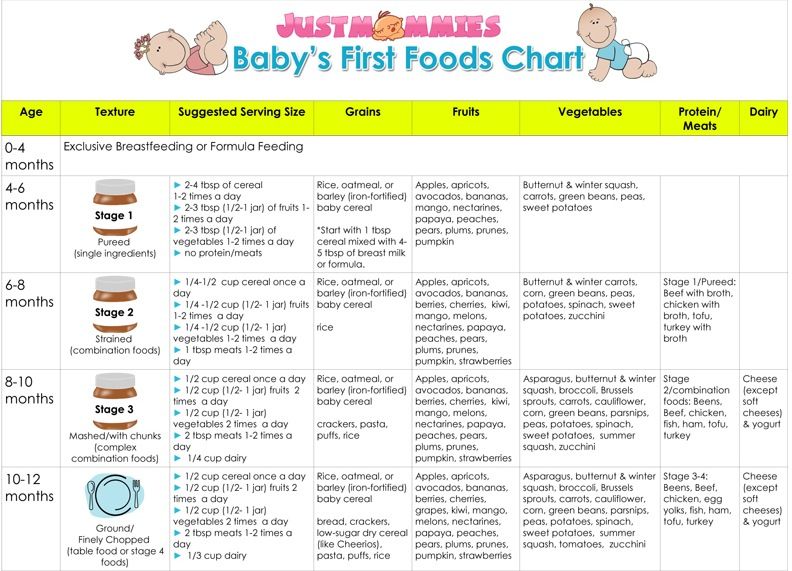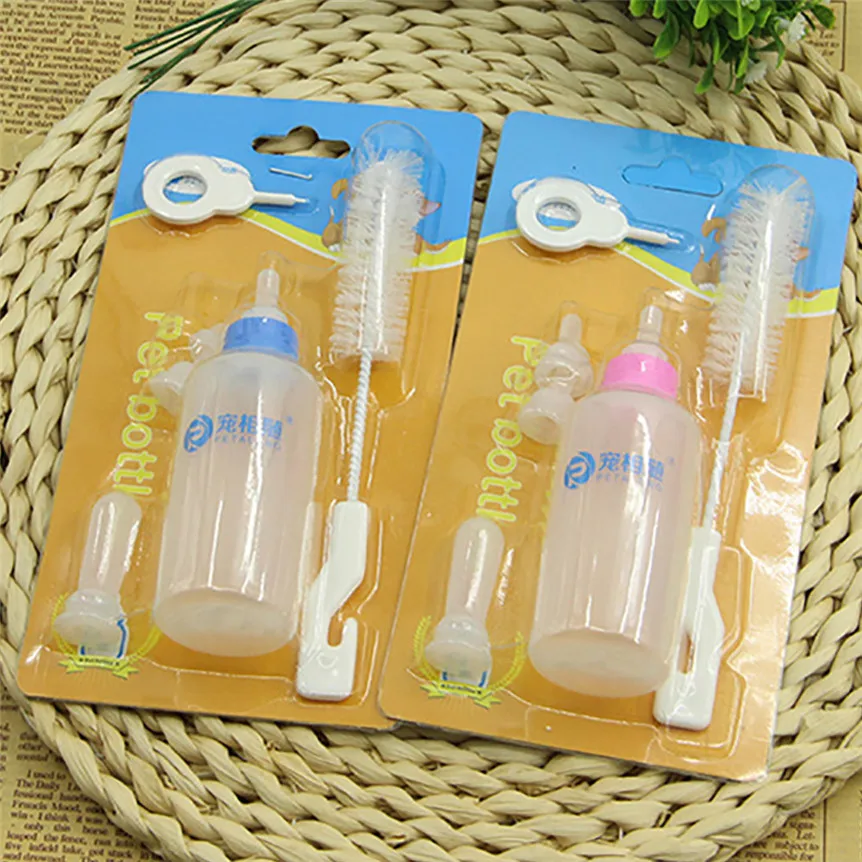Nine month baby food chart
9-Month-Old Baby’s Food: Charts, Menu, and Ideas
Read this article to learn more about the best foods for 9-month-old babies.
What are the best foods for a 9-month-old baby?
It might seem like your baby was a newborn only yesterday, but at 9 months old, they’re developing their own temperament and preferences. Your baby might try the foods that you put on their plate, but they’ll quickly form an opinion and decide which they like and which they don’t.
Most 9-month-old babies are probably partially weaned off breast milk. Many parents choose to continue to nurse their babies once they’ve started to eat solid foods. The process of stopping breastfeeding usually starts when a baby is approximately 6 months old. As they get older, you can introduce new foods to their diet.
From 9 to 12 months old, your baby needs approximately 750–900 calories every day. Between 400 and 500 of those calories should come from breast milk or formula.
The remaining calories will come from food. Don’t introduce cow milk until your baby is at least a year old. Before that, their digestive systems aren’t prepared to digest cow milk properly.
Take a quiz
Find out what you can do with our Health Assistant
Here are some of the best baby foods for 9-month-olds:
- Non-citrus fruits — Fruits are a great way to provide a sweet snack for your baby without any added sugar. For now, stay away from citrus and stick to fruits like apples, pears, mango, papaya, bananas, and peaches.
- Oatmeal — Oats are packed with fiber and minerals, which can do wonders for your baby’s digestion.
- Bread — As long as your baby doesn’t have any food allergies, you can give them bread. Try to give them whole grain bread, since it’s more nutritious than white bread.
- Vegetables — Your 9-month-old baby can eat vegetables prepared many different ways. From pureed carrots or roasted cauliflower to fresh leafy greens, offer your baby different vegetables to see what they like best.

- Tofu — Tofu is full of protein, healthy fats, iron, and zinc. Lots of babies like it since it has such a mild flavor.
- Egg yolks — Egg whites are potentially allergenic, so most health care providers recommend waiting until your baby is a year old to introduce them. However, at 9 months old, your baby can try egg yolks. Make sure that you cook the yolks thoroughly.
- Lean meats — Even though your baby gets protein and iron from breastmilk or formula, you can start adding other sources of protein into their diet. If your family eats meat, lean red meat, chicken breasts, and fish are great options. Remember to cook any meat thoroughly and cut it into small pieces so that your baby can eat it easily.
- Cheese and yogurt — Your baby shouldn’t have cow milk yet, but they can start eating сheese and yogurt. These are great foods for 9-month-olds, since they’re full of calcium, and most babies love them.
 Stick to soft, pasteurized cheeses such as cottage cheese and natural yogurt without artificial flavorings.
Stick to soft, pasteurized cheeses such as cottage cheese and natural yogurt without artificial flavorings. - Nut butters — Health care providers used to advise avoiding nuts during infancy because they were believed to be allergenic. However, experts now agree that nuts are safe for babies older than 6 months old, as long as they haven’t shown signs of allergies to other foods. Nut butters are packed with protein, healthy fats, vitamins, and minerals.
- Beans — Beans and lentils provide lots of protein, iron, and minerals. You can puree them or mix them with rice to create a balanced meal for your baby.
Love Flo and highly recommend it to everyone! I'm pregnant because Flo helped me track my period and ovulation.
9-month-old baby’s food menu
When offering 9-month-old babies food (especially finger food), size is important. Pieces should be large enough to pick up, but small enough that your baby won’t choke.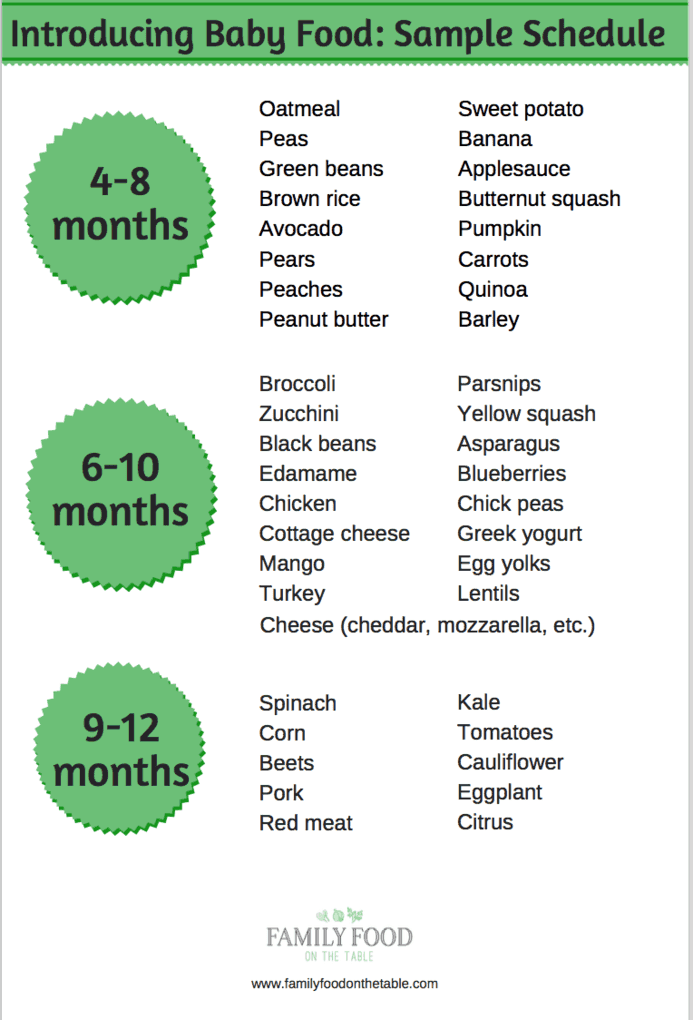 Try to aim for cubes about a third of an inch in size. This is just a little bit bigger than a standard pea.
Try to aim for cubes about a third of an inch in size. This is just a little bit bigger than a standard pea.
Here are some ideas for a healthy, balanced menu for your 9-month-old baby:
Breakfast:
- Cheese sandwich
- Oats with yogurt and fruit
- Egg yolk scramble with bread
Lunch (non-vegetarian options):
- Meat and vegetables
- Creamy chicken soup
- Pasta with meat or chicken
- Beans and rice
Dinner:
- Tofu and vegetables
- Mashed potatoes and cheese
- Macaroni and cheese
Snacks:
- Yogurt parfait
- Peanut butter and fruits
Remember that your baby still needs formula or breast milk. If you’re trying to get your baby used to an eating schedule, store your breastmilk and feed it to your baby when they wake up, right before bed, or between meals.
Quick ideas for 9-month-old babies
- Sandwiches — Sandwiches are easily customizable to your baby’s taste.
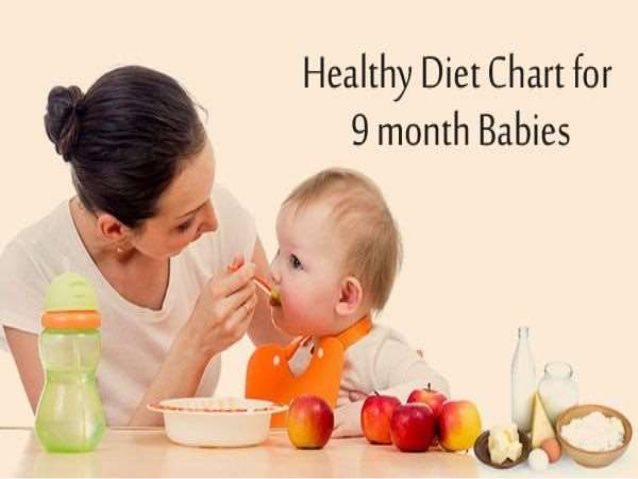 You can try all kinds of ingredients such as cottage cheese, chicken, avocado, vegetables, peanut butter, and fruits.
You can try all kinds of ingredients such as cottage cheese, chicken, avocado, vegetables, peanut butter, and fruits. - Pasta — Your baby can eat pasta now, so you can try creating one of your favorite pasta dishes for your baby.
- Fruit smoothies — Mix some yogurt with your baby’s favorite fruits and vegetables for a quick, easy, and delicious snack! But make sure the yogurt is low on sugar and artificial sweeteners.
9-month-old baby’s food advice
Try to avoid fried foods, sugary drinks, and processed foods, which should be offered very sparingly due to their low nutritional value. Scientific studies have shown that babies can become accustomed to unhealthy foods like french fries, salty snacks, and sugary sweets from a very young age.
As you introduce your baby to new foods, remember to be patient and provide lots of options. Once your baby discovers there’s a whole world of delicious new foods waiting for them, they’ll love exploring all the flavors and textures that are out there!
9 Months Old Baby Food Chart Along With Recipes
With thousands of options and multiple voices of advice, the initial stage of parenthood isn’t the least bit easy.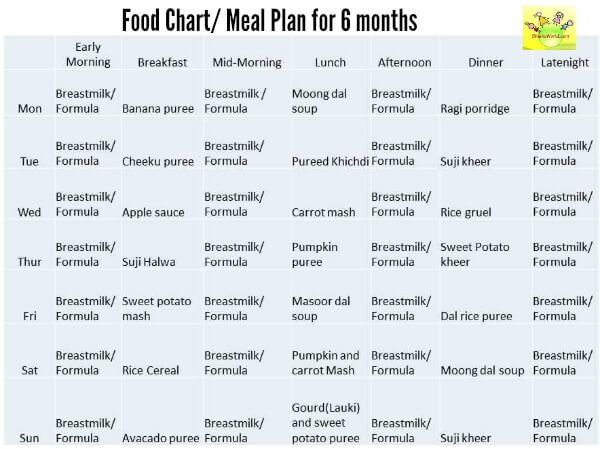 Amidst staying up all night and diaper duties, feeding healthy food to your baby may seem like a tough task.
Amidst staying up all night and diaper duties, feeding healthy food to your baby may seem like a tough task.
Also Read: 9 Months Old Baby Milestones
Video: Food Ideas for 9 Month Old Baby
How Much Food Should a Baby Eat at This Stage?
While babies may not be able to consume everything that adults eat, their taste buds will be delighted with the introduction of new food and flavours. It can be scary and troublesome for most new parents to figure out what to give and how much to give their child, but know that there is no golden rule by which you must operate. Do not place unnecessary stress on the food itself, and remember to keep it as nutritious and natural as possible.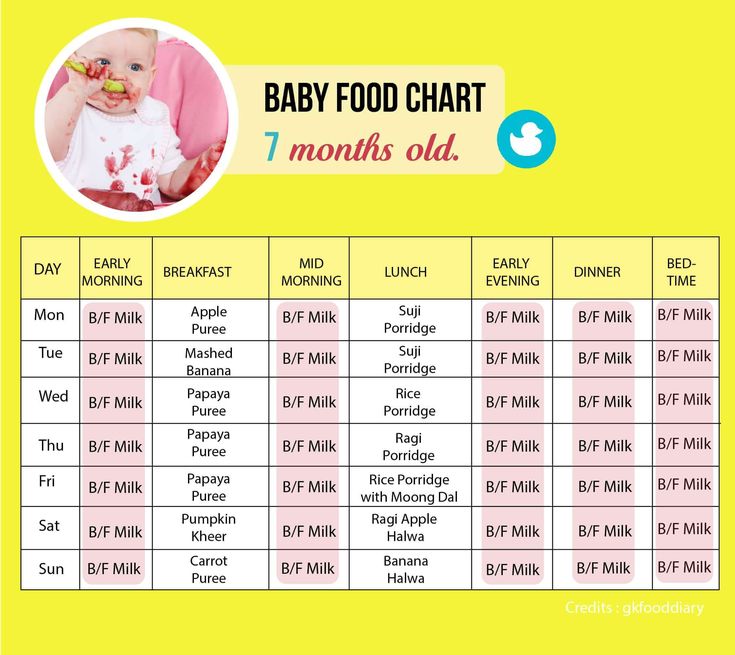
As the experience is new for your baby, he/she will nibble on the food and spit it out if the taste is not enjoyed. Remember that a baby’s tummy is the size of a person’s fist, and it doesn’t take a lot to get them full. Also, since their taste buds are still developing, they may not like all the different kinds of food you give them. Some of them will like vegetables, some will like fruits, and some will even determine what texture of food they like. It can be either in puree form, mashed, or even small tiny chunks. Trial and error are crucial at this stage to understand your baby’s preference.
Don’t forget, though, that your baby is also getting all the nutrients required for formula or breast milk. Make sure that your baby is eating three meals a day in addition to the milk.
Best Food for a Nine Month Old Baby
Your baby will be adventurous or develop into a fussy eater, with the introduction of new food, so make sure you pick the best and delicious tasting food for them.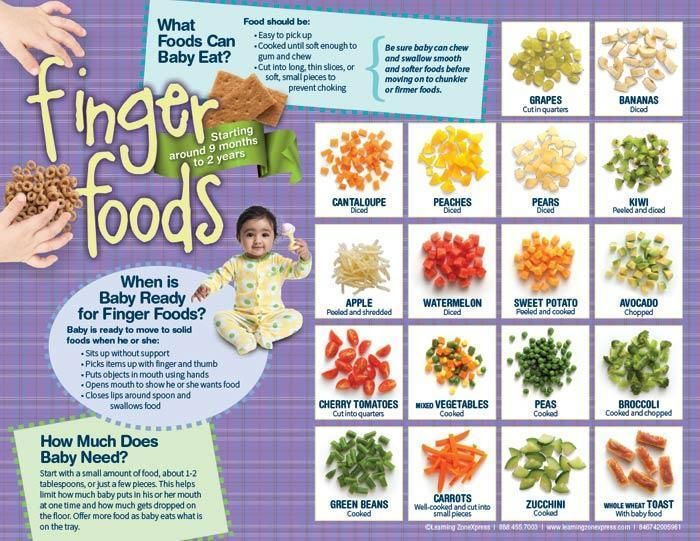
Some of the food you can start with for your 9-month-old Indian baby is:
1. Fruits
Berries such as blueberries, melons, cranberries, or dates, figs, cherries, and citrus fruits can be cut into 1/4th their size and given to your child. Always ensure these are completed cooked and either pureed or mashed before serving your baby
2. Vegetables
Brocolli, Asparagus, potatoes, eggplant, cauliflower, mashed potatoes, onions, and parsnips, all which can be cooked and mashed, are nutritious and a great food option for your baby.
3. Meat and Egg
Eggs, chicken and fish which are thoroughly cleaned and cooked should be fed to your baby. Do not give any raw meat or runny eggs.
4. Water and Juices
Your baby’s digestive system is still developing, so make sure he/she gets plenty of water. Try making natural juices (no sugar) at home instead of giving your baby processed juice.
5. Cheese and Other Dairy Products
Cream cheese, cottage cheese or paneer, dahi or yoghurt, ghee, and butter can be given in very small quantities to your baby.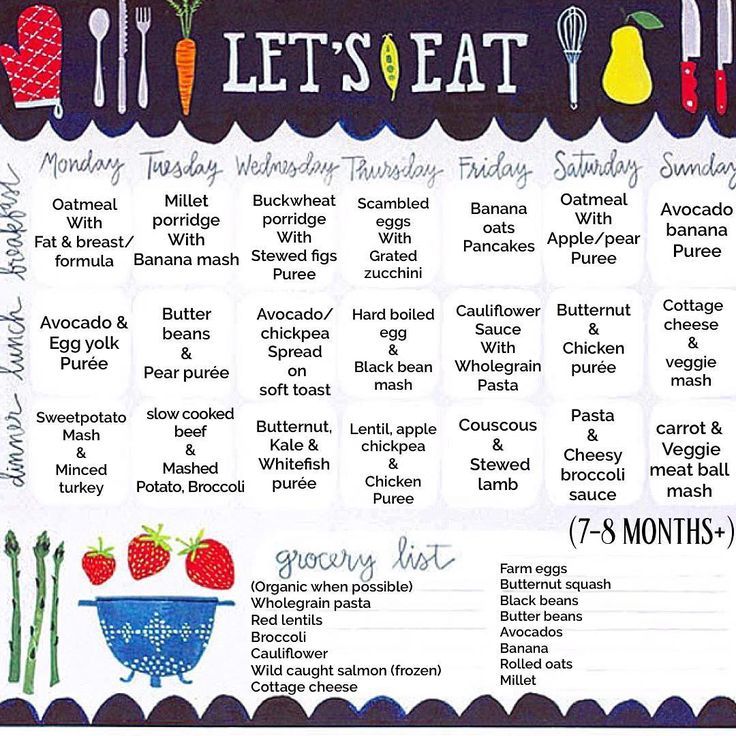
6. Cereals
Cooked quinoa, millets, whole wheat pasta (softened), rice, and oatmeal are tasty options to give your baby
7. Grains
Toast, small pieces of chapatti or flatbread, crackers give your baby his/her fill of grains.
8. Legumes
Mashed lentils, beans, and soups made from legumes are a great way to feed flavourful, yet nutritious food to your baby.
9. Spices
As your little one’s taste enhances, try using small quantities of asafoetida, cloves, coriander, mustard seeds, fennel seeds, fenugreek, nutmeg, curry leaves, cinnamon, cardamom, bay leaf, turmeric, and garlic while cooking for him/her.
Video: Diet Plan for a 9 Month Old Baby
9 Month Old Baby Food Chart/Meal Plan
Make sure your baby’s food is soft to prevent choking.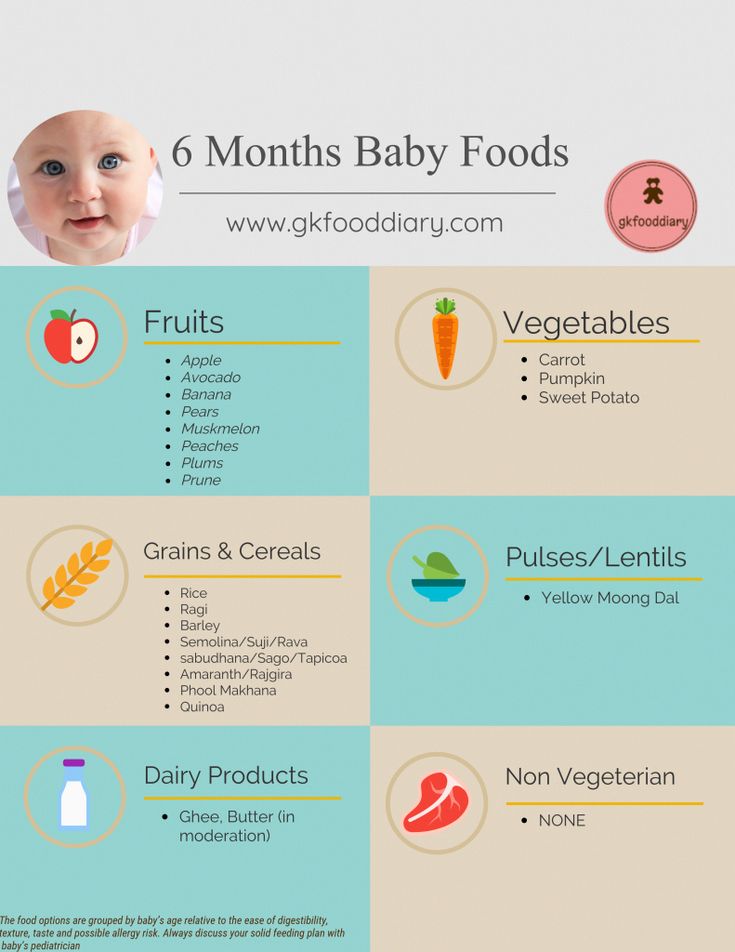 Here is a detailed schedule of what you can give your child at meal times and as snacks:
Here is a detailed schedule of what you can give your child at meal times and as snacks:
Diet for a 9 Month-Old – Week 1, Day 1
Diet for a 9 Month-Old – Week 1, Day 2
Diet for a 9 Month-Old – Week 1, Day 3
Diet for a 9 Month-Old – Week 1, Day 4
Diet for a 9 Month-Old – Week 1, Day 5
| Early morning | Mother’s milk /formula feed |
| Breakfast | Mashed banana |
| Mid-morning | Mother’s milk /formula feed |
| Lunch | Idli with ghee or butter |
| Evening | Mother’s milk /formula feed |
| Dinner | Dal (lentil)- spinach soup |
Diet for a 9 Month-Old – Week 1, Day 6
Diet for a 9 Month-Old – Week 1, Day 7
| Early morning | Mother’s milk /formula feed |
| Breakfast | Mashed banana |
| Mid-morning | Mother’s milk /formula feed |
| Lunch | Roti dipped in dal |
| Evening | Mother’s milk /formula feed |
| Dinner | Rice with egg yolk or dal |
Diet for a 9 Month-Old – Week 2, Day 1
| Early morning | Mother’s milk /formula feed |
| Breakfast | |
| Mid-morning | Mother’s milk /formula feed |
| Lunch | |
| Evening | Mother’s milk /formula feed |
| Dinner | Tomato- pumpkin- rice soup |
Diet for a 9 Month-Old – Week 2, Day 2
Diet for a 9 Month-Old – Week 2, Day 3
| Early morning | Mother’s milk /formula feed |
| Breakfast | |
| Mid-morning | Mother’s milk /formula feed |
| Lunch | Rice- carrot porridge |
| Evening | Mother’s milk /formula feed |
| Dinner | Bajra (pearl millet)- moong dal (green gram split) khichdi |
Diet for a 9 Month-Old – Week 2, Day 4
Diet for a 9 Month-Old – Week 2, Day 5
| Early morning | Mother’s milk /formula feed |
| Breakfast | |
| Mid-morning | Mother’s milk /formula feed |
| Lunch | Mashed avocado + sweet potato + murmura (puffed rice) powder |
| Evening | Mother’s milk /formula feed |
| Dinner |
Diet for a 9 Month-Old – Week 2, Day 6
Diet for a 9 Month-Old – Week 2, Day 7
| Early morning | Mother’s milk /formula feed |
| Breakfast | Oats porridge |
| Mid-morning | Mother’s milk /formula feed |
| Lunch | Roti dipped in dal |
| Evening | Mother’s milk /formula feed |
| Dinner | Tomato- pumpkin- soup |
Diet for a 9 Month-Old – Week 3, Day 1
Diet for a 9 Month-Old – Week 3, Day 2
Diet for a 9 Month-Old – Week 3, Day 3
Diet for a 9 Month-Old – Week 3, Day 4
| Early morning | Mother’s milk /formula feed |
| Breakfast | Idli with ghee or butter |
| Mid-morning | Mother’s milk /formula feed |
| Lunch | |
| Evening | Mother’s milk /formula feed |
| Dinner |
Diet for a 9 Month-Old – Week 3, Day 5
Diet for a 9 Month-Old – Week 3, Day 6
Diet for a 9 Month-Old – Week 3, Day 7
Diet for a 9 Month-Old – Week 4, Day 1
Diet for a 9 Month-Old – Week 4, Day 2
Diet for a 9 Month-Old – Week 4, Day 3
Diet for a 9 Month-Old – Week 4, Day 4
Diet for a 9 Month-Old – Week 4, Day 5
Diet for a 9 Month-Old – Week 4, Day 6
Diet for a 9 Month-Old – Week 4, Day 7
| Early morning | Mother’s milk /formula feed |
| Breakfast | Oats-apple porridge |
| Mid-morning | Mother’s milk /formula feed |
| Lunch | Roti dipped in dal |
| Evening | Mother’s milk /formula feed |
| Dinner |
*Introduce small portions and then depending on your baby’s taste and appetite, increase the portion.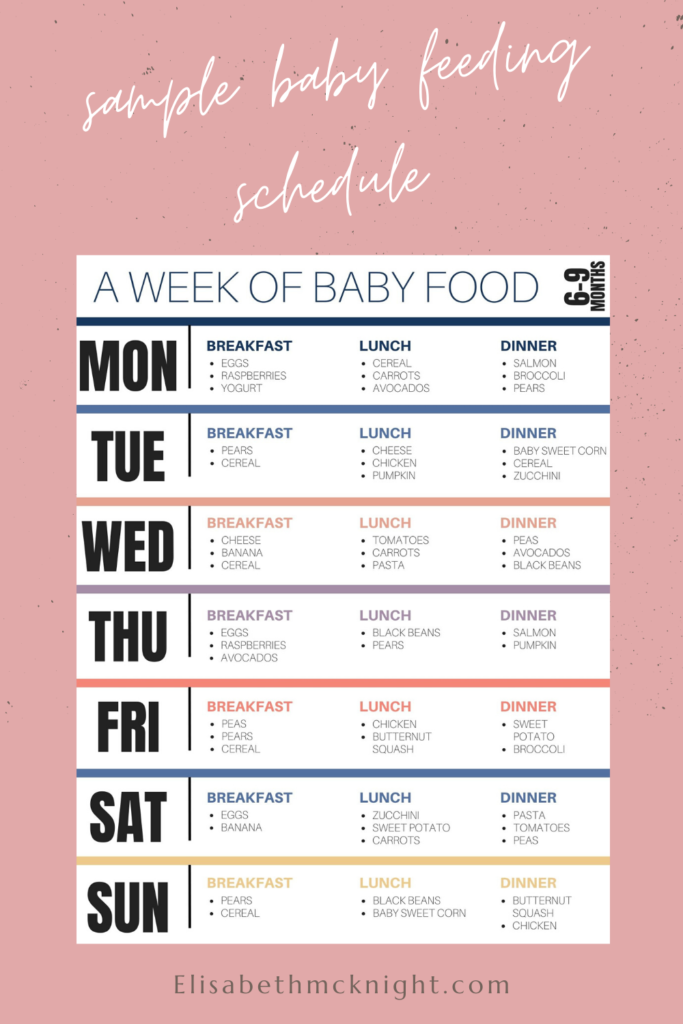 Never force your baby to finish the food
Never force your baby to finish the food
Food to Avoid
It is important to serve your baby clean and fresh food. Be alert and notice the texture of food that your baby prefers, so that you can incorporate more of it into the next meal. While your child can now happily join you at family meals, here are a few foods that must be avoided at all times.
1. Honey
It contains bacteria that can cause a serious illness in your child, by damaging the intestines and leading to a rare syndrome called infant botulism. It can also be damaging to a baby’s emerging teeth.
2. Some Types of Fish
Shark, swordfish, and marlin contain high traces of mercury which can affect a baby’s nervous system. Also, avoid shellfish to avoid food poisoning
3. Whole Nuts
Do not give whole nuts to your child, until he/she turns five, in order to avoid choking
4. Sugar
Sugary food is bad for your kid’s growing teeth. These include ice-creams, biscuits, and sweets
5.
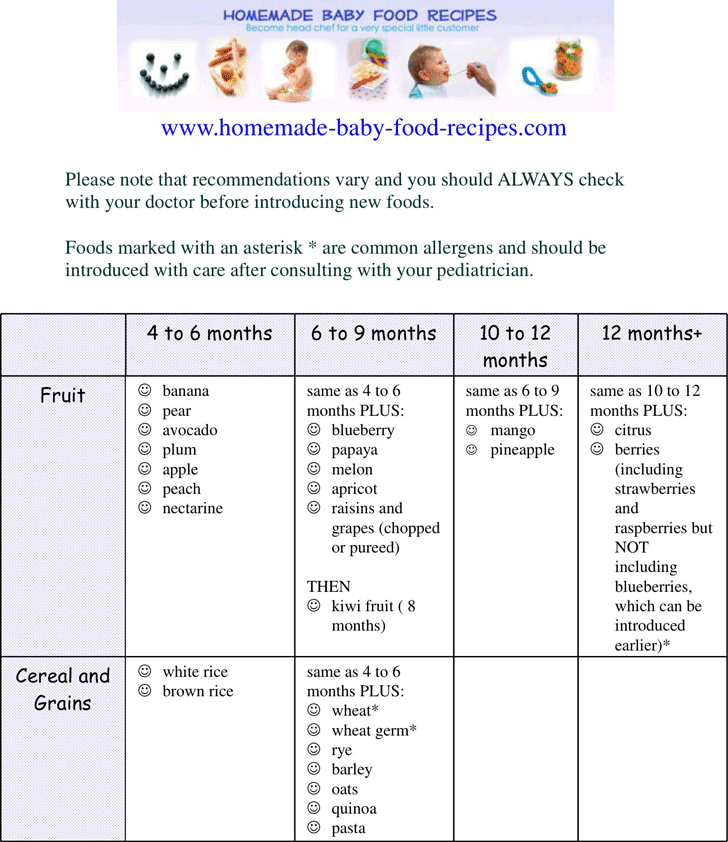 Salt
SaltDo not add salt to your baby’s food, as the kidneys cannot cope. Avoid salty foods, such as namkeens and chips altogether. Babies should have less than 1 gm of salt a day
6. Citrus or Acidic Fruits
Some infants may suffer from acidity due to citric fruits. However, a dash of lemon is allowed in purees.
7. Peanuts/Tree Nuts
This is sensitive food and may cause allergic reactions in your baby. It is typically introduced 1 year onwards.
8. Whole Milk
This can cause tummy issues and should never be supplemented with breast milk. It can also hinder absorption of iron, which is crucial to an infant’s growth
Can You Give Your Baby Finger Foods and Snacks?
Nine-month-old babies are generally ready for finger food and snacks. They have what you can call, a ‘Pincer grasp’, which is a skill where they pick up small objects with their thumb and forefingers. If your baby has started picking up small objects with his/her fingers without any support and can chew small bites of food, then its time to introduce finger foods for him/her.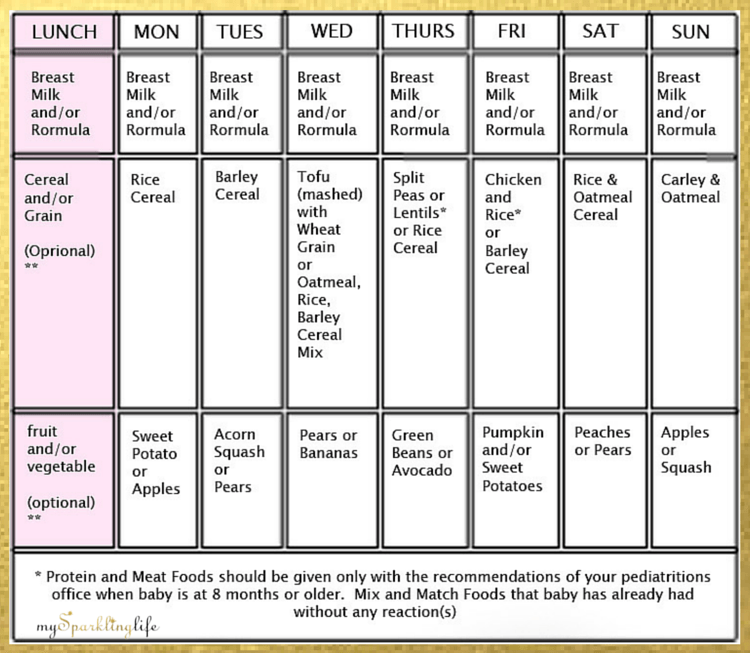
Finger foods can be cooked carrots, apples, pears, cucumbers, or even paneer, that can be chewed well by baby teeth. Cut all of them into small, long shapes for your baby to hold and nibble on. Be cautious and never leave your child alone while they have finger food.
If your baby has still not picked up things with his/her fingers, wait for a month or two before introducing finger food
You can include one or two snacks between meal times for your 9-month-old baby. Give small quantities of food at regular intervals, which can help weaning easy in the future. Make sure that this does not affect breastfeeding.
Video: 9 Month Old Baby Food Recipes
Homemade Baby Food Recipes for 9 Month Old Babies
Here are a few recipes that you canwhip up quickly to delight your baby at home.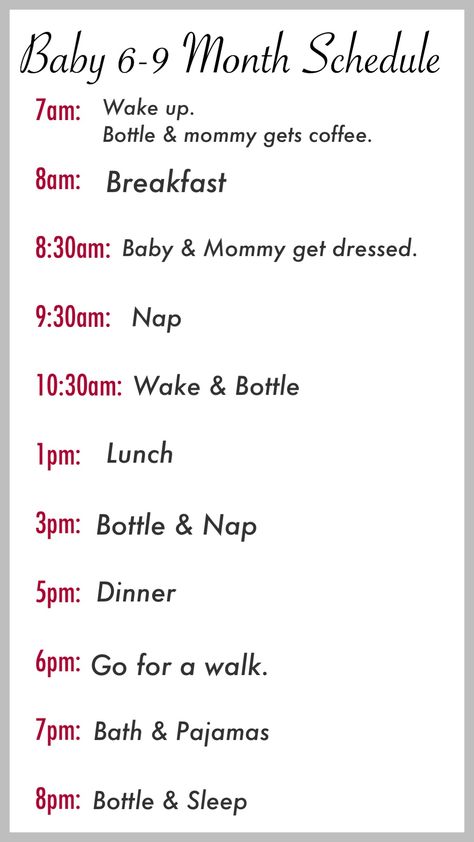
1. Pumpkin Puree
An easy and simple recipe that is full of beta-carotene, potassium, and iron.
Ingredients:
- 1 small pumpkin
- 1-2 cups of water, vegetable stock or breast milk
How to Prepare:
Cut the pumpkin and peel away the skin. Scoop out all the seeds and put the fruit in a blender or food processor. Add water or vegetable stock till you get the desired consistency. Blend until smooth.
Once you have the puree, cook it in a cooker for 10-15 minutes (1 or 2 whistles).
2. Quinoa and Banana Mash
A nutrition rich and filling meal that is great for lunch or dinner.
Ingredients:
- 1/2 banana
- Pinch cinnamon
- 3 tablespoons cooked quinoa
- 1 tablespoon whole milk yoghurt
How to Prepare:
Mash the banana in a bowl. Cook 3 tbsp of quinoa, without any oil, in a separate pan with water for 10-12 minutes.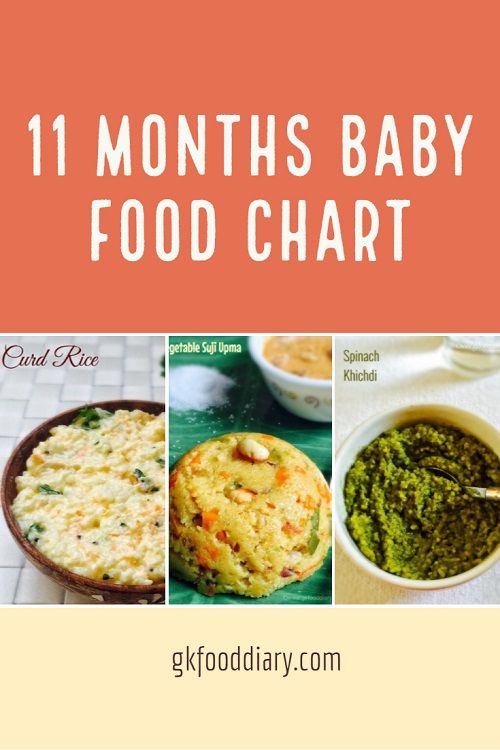 Add the cooked quinoa to the banana, along with yoghurt, and stir to combine the ingredients.
Add the cooked quinoa to the banana, along with yoghurt, and stir to combine the ingredients.
You can also add powdered cinnamon (a pinch) for taste. Serve cold or at room temperature.
3. Plain Vegetable Khichdi
An staple Indian recipe when you are introducing rice and vegetables to your child’s diet.
Ingredients:
- ½ cup rice
- ½ cup moong dal (green gram)
- 1 cup mixed vegetables washed properly and chopped into small pieces (carrots, peas, potatoes and beans)
- 1 teaspoon ghee
- A pinch of turmeric
- ½ teaspoon cumin seeds
- chopped coriander leaves
How to Prepare:
Clean the dal and rice. Soak both of them in water for thirty minutes. Heat the ghee in a pressure cooker. Now add the cumin seeds till they crackle. Follow it with dal and rice and then vegetables. All these can be sautéed, followed by a pinch of salt. Add water and pressure cook this for 3-4 whistles, till everything is well- cooked.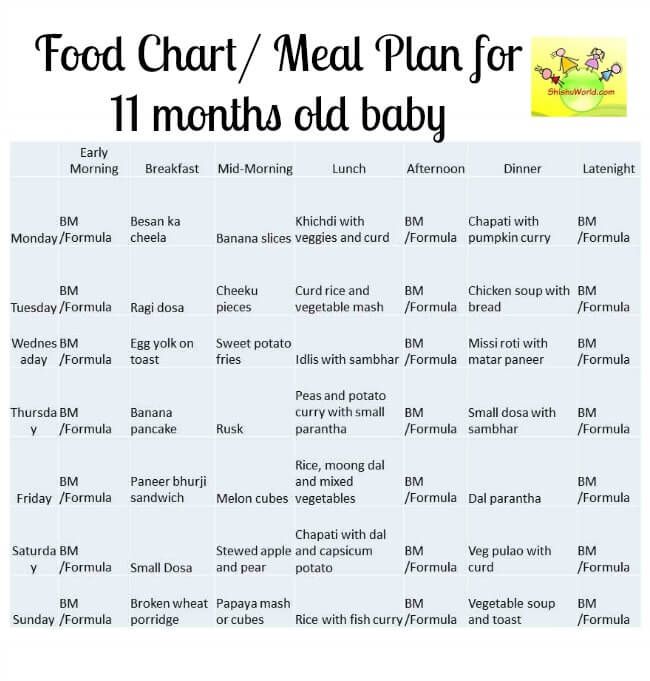
Mash khichdi lightly with a spoon. Serve it with a little ghee on the top.
4. Atta Halwa
Atta halwa or porridge is a food recipe for 9 month old Indian baby
Ingredients
- 2 teaspoon Atta
- ½ tsp ghee
- 2 cups hot water
- Formula or breast milk
How to Prepare:
Heat ghee in a pan and add atta. Roast the atta, stirring continuously. Once the atta is slightly roasted and gives off a nice aroma, slowly add hot water. Keep stirring to avoid lumps and bring it to your desired consistenty. Your baby will love the smooth texture of ghee. Turn off the heat.
Once the atta halwa is a little cool, add milk to adjust the consistency and add flavour to the halwa. You can add banana puree or applesauce for sweetness.
5. Finger Vegetables
Finger foods for 9-month-old baby are perfect for a mid-morning or evening snack
Ingredients
- 1 carrot
- 1 pumpkin
- 1 sweet Potato
- 1 zucchini/ cucumber
How to Prepare:
Cut any or all of the vegetables into long slices that your child can grasp in his/her.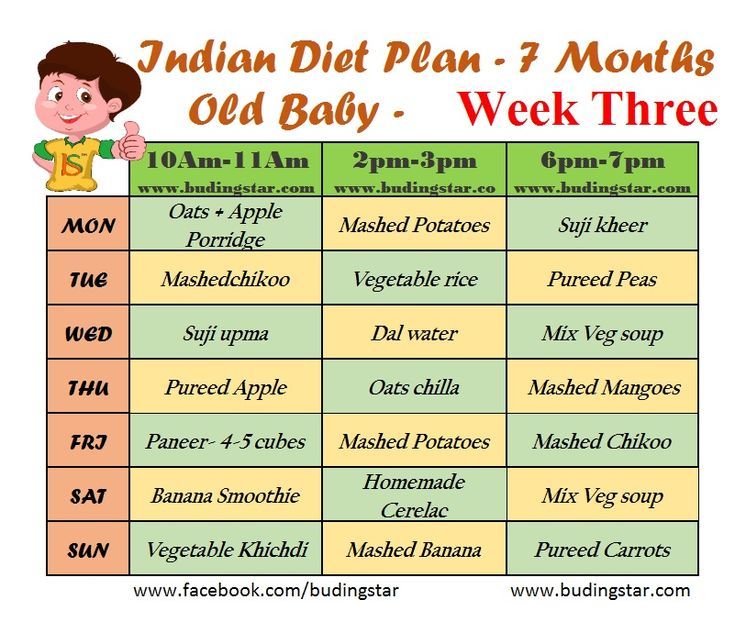 Steam them in a pressure cooker for 5-7 minutes. Serve warm or at room temperature.
Steam them in a pressure cooker for 5-7 minutes. Serve warm or at room temperature.
6. Oats Pancakes
These pancakes are super easy to make and delicious, as well.
Ingredients
- 1/4 cup oats
- 1 medium banana
- 1/4 cup milk
How to Prepare:
Mash the banana in a bowl, and add the milk. Mix well and add oats. Mix until well blended. Heat up a pan and add 1-2 drops of oil. Add 3-4 tablespoon of the mixture, and let it cook on one side. After 30 seconds to a minute, or until slightly brown, flip and cook well. Serve warm.
7. Vegetable Soup
This is a comfort food, especially in the winters and monsoon, and easy to make for your baby.
Ingredients
- 1/2 carrot chopped
- 3-4 beans chopped
- 10 peas
- 1/2 tomato chopped
- 1/2 potato finely chopped
- 1/2 tablespoon ghee
- Pinch of pepper
- Pinch of jeera powder
How to Prepare:
Pressure cook all the vegetables in 2 cups of water for 3 whistles.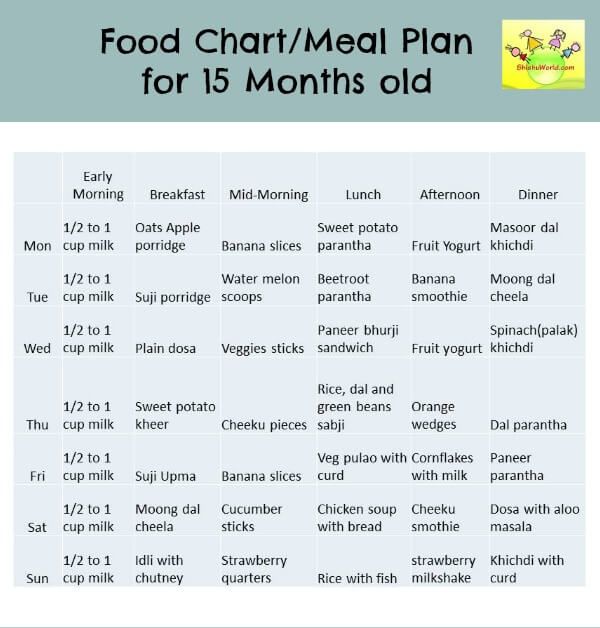 Let them cool, and blend into a smooth puree. Reheat the puree, add water if required, as well as the pepper and jeera powder. Serve warm.
Let them cool, and blend into a smooth puree. Reheat the puree, add water if required, as well as the pepper and jeera powder. Serve warm.
Feeding Tips
- Start by taking any solid food that you want to introduce to your child in a big spoon and give them little nibbles off the spoon.
- All vegetables and fruits can be given to babies at this stage, but create a schedule and discuss it with your paediatrician before deciding. This can help avoid any allergies or reactions your baby may have.
- Follow a ‘4-day rule,’ i.e. wait for 4 days before introducing a new food, in order to check for allergies.
Time flies, and soon your little nine month old will be walking and running. Make the most of this time by introducing healthy food habits and create a solid foundation for their food habits, down the line.
Disclaimer:
- Each child is different and so use these meal plans as a trusted guide as per your discretion.
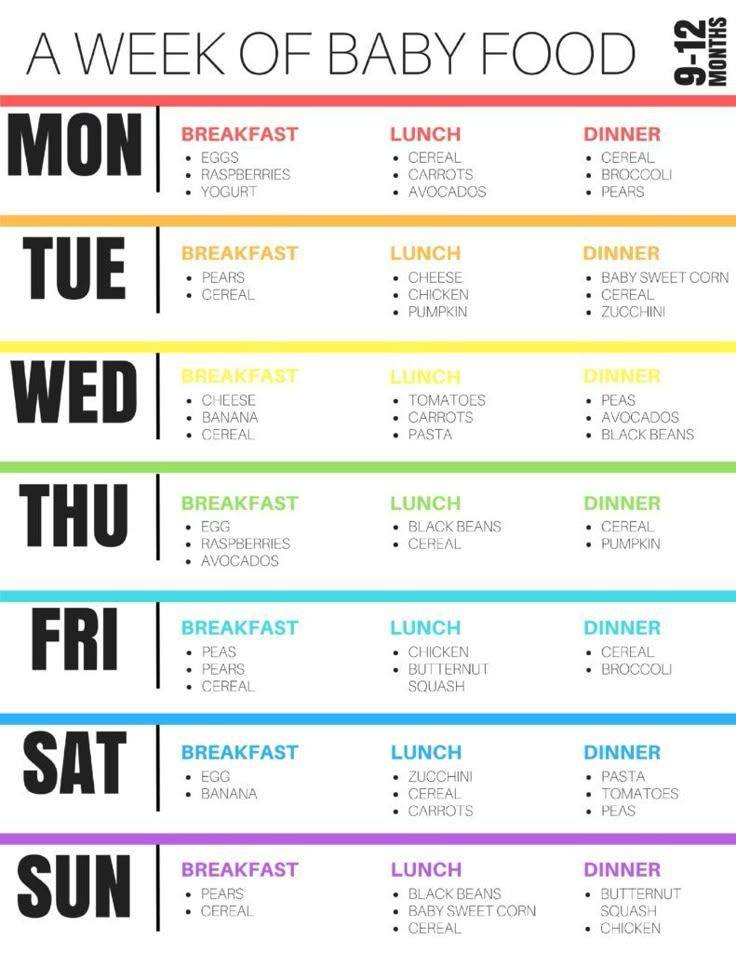 You can modify the meals according to your child’s preferences / requirements.
You can modify the meals according to your child’s preferences / requirements. - Never force-feed a child.
- While preparing formula, please follow the instructions on the box and use the measuring spoon provided with it.
- While introducing solid food to a baby, initially, one needs to prepare watery gruels/soups. As a child gets older, the caretaker/ mother has to increase the thickness of the liquids slowly according to the child’s capacity to swallow. Foods that are too thick can cause stomach upset/ unnecessary load; while excessively watery food might cause the child to remain hungry.
- Some kids may eat less on some days and that is absolutely alright. However, if a child eats less for more than 3-4 consecutive days, please visit a doctor to guide further.
- A child may eat less during the teething phase or if he/she may not be feeling well. You could increase breast milk /formula feeds on those days. Re-introduce the foods once the child is back to normal.
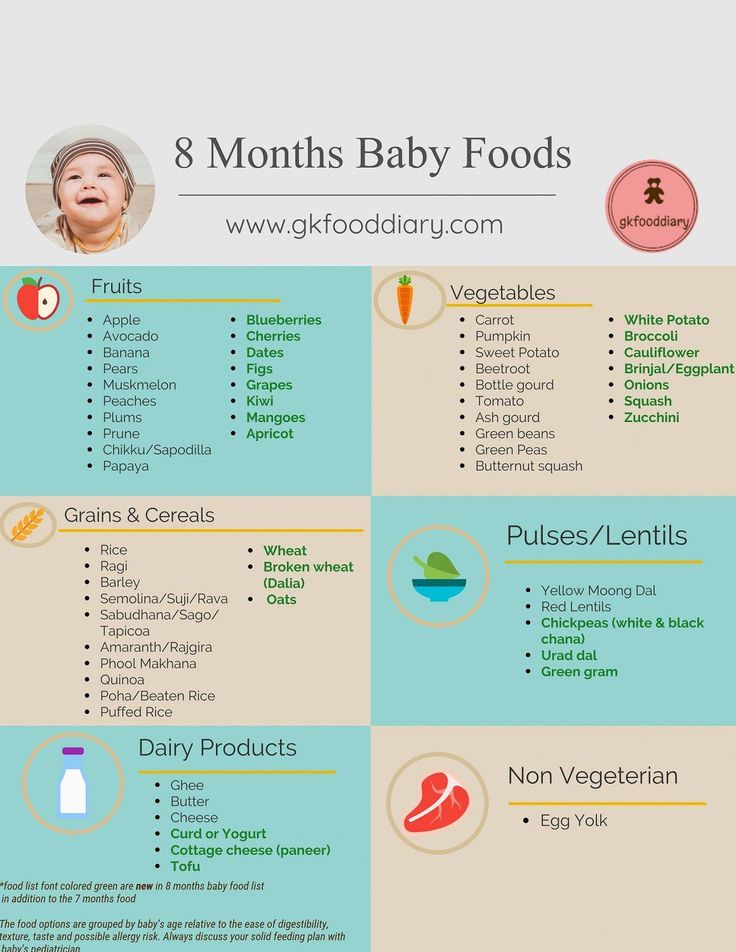
- Don’t stop feeding if the child is suffering from diarrhoea.
- You can alter the taste of the food by adding some natural flavours like cinnamon, jeera powder, lemon juice, curry leaves etc. if the child doesn’t accept the food initially.
- If your child suffers from an allergy to nuts, gluten or eggs, please consult your doctor before feeding him/her any foods that may contain them.
Also Read: 10 Month Old Baby Food Ideas
Baby menu at 9 months
6-12 months
Article
5/5 1 reviews
Although breast milk or formula remains the mainstay of infant nutrition at this age, a 9-month-old baby's menu becomes more varied with new complementary foods. The correct diet of the child is the basis of his harmonious development, good health and good mood.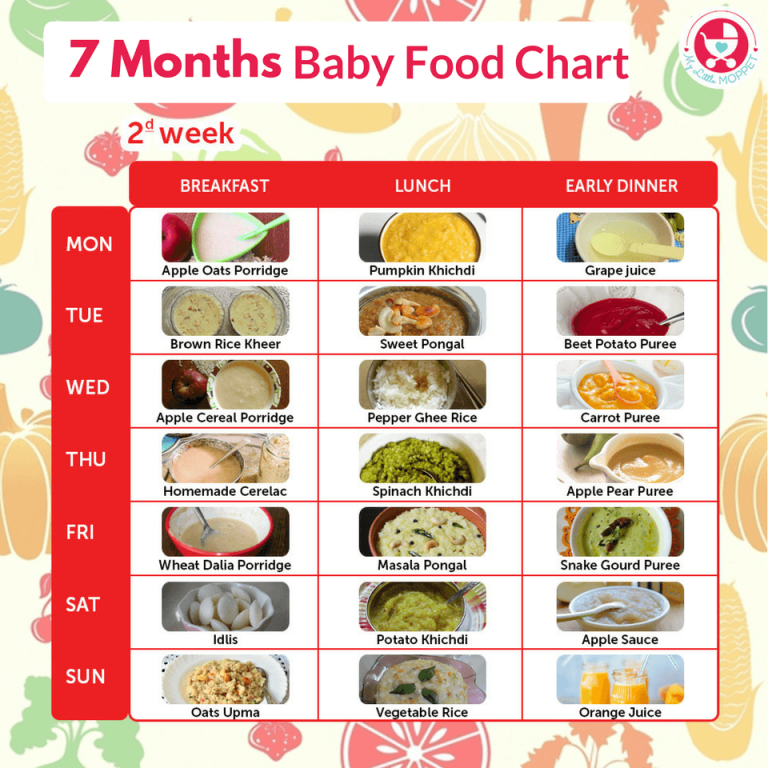 But how to organize a diet, what can be given at this age and how much should a child eat at one meal?
But how to organize a diet, what can be given at this age and how much should a child eat at one meal?
8 min. for reading Feb. 17, 2022
The correct diet for a nine-month-old baby includes 5 meals: a day the baby receives liquid food twice and thick food three times. This is due to the fact that mashed potatoes and cereals take longer to digest than milk, so they give the baby a longer energy supply. Feeding is usually carried out at intervals of 4 hours. If the baby asks to eat 2-3 hours after liquid food, offer her a baby snack, fruit or vegetable (in small pieces or in the form of a puree).
A 9-month-old baby's daily diet includes many healthy foods and drinks that provide essential nutrients such as vitamins, proteins, carbohydrates, fats and minerals. In addition to milk and infant formula, the following foods can be given to a child:
- Fruits and vegetables in the form of puree (apple, pear, cauliflower, etc.
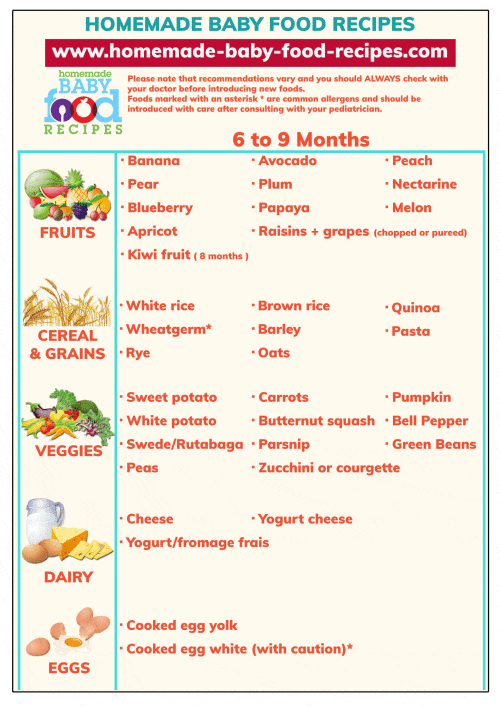 )
) - Fruit juices and compotes without sugar.
- Meat in various forms.
- Fish.
- Kashi from various cereals.
- Chicken or quail egg yolk.
- Children's fresh cottage cheese.
- Children's low-fat kefir.
- Children's cookies, croutons, bread.
Read also: The baby refuses new products
According to WHO recommendations, by the 9th month, all of the above products should already be on the menu. If something from the food is still unfamiliar to your child, it is recommended to gradually add it to the diet.
Start with smaller portions and see how your child reacts to the new food. If there is no allergic reaction to the product, you can increase the volume and add it to new dishes. New complementary foods are recommended to be introduced at intervals of 5-7 days. An indicative table for one day will help to create an optimal diet for health. It also shows how much formula or milk the baby should eat per day.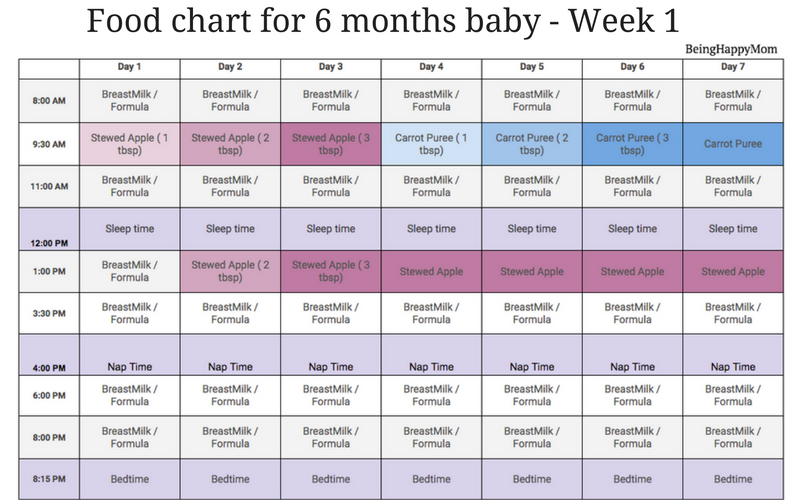
* infant formula.
**Dairy-free porridge should be diluted with breast milk or infant formula given to the baby. Milk porridge is diluted with water.
| I feeding 6 hours | Breast milk or formula for infants with cow's milk protein intolerance | 200 ml |
| II feeding 10 hours | Dairy-free porridge* | 180 g |
| Vegetable oil < | about 1 tsp | |
| Fruit puree (apple, pear) | 70 g | |
| III feeding 14 hours | Vegetable puree or pureed soup | 180 g |
| Vegetable oil | about 1 tsp. | |
| Meat puree (rabbit, turkey) | 50 g | |
| Fruit juice | 70 g | |
| IV feeding 18 hours | Fruit puree | 50 g |
| Vegetable puree or dairy-free porridge | 180 g | |
| Vegetable oil | about 1 tsp.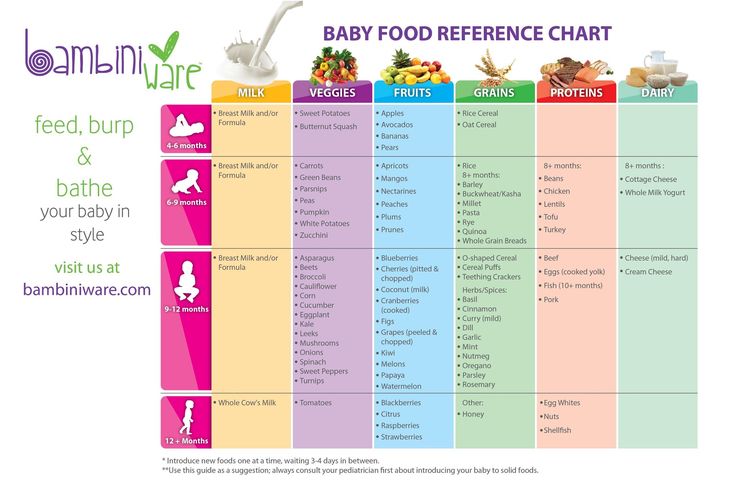 | |
| Meat puree | 50 g | |
| V feeding 22 hours | Breast milk or formula for infants with cow's milk protein intolerance | 200 ml |
*dairy-free porridge should be diluted with breast milk or it is safe for children with allergies to cow's milk proteins.
** you can eat porridge or vegetables, so you can eat grass - porridge with vegetables.
1st day
| First breakfast | Breast milk or formula |
| Second breakfast | Buckwheat porridge with pumpkin, juice |
| Lunch | Pumpkin steam cutlets, veal puree |
| Snack | Rusks or baby biscuits, yoghurt |
| Dinner | Cauliflower puree |
| Second dinner | Breast milk or formula |
2nd day
| First breakfast | Breast milk or formula |
| Second breakfast | Oatmeal, berry juice |
| Lunch | Steamed fish, rice, fruit compote |
| Snack | Vegetable puree |
| Dinner | Vegetable puree |
| Second dinner | Breast milk or formula |
3rd day
| First breakfast | Breast milk or formula |
| Second breakfast | Semolina porridge, quail egg yolk |
| Lunch | Steamed zucchini, boiled veal, apple compote |
| Snack | Pumpkin and apple puree |
| Dinner | Curd casserole with carrots |
| Second dinner | Breast milk or formula |
Fourth day
| First breakfast | Breast milk or formula |
| Second breakfast | Rice porridge, fruit puree |
| Lunch | Mashed potatoes or turkey meatball soup |
| Snack | Carrot Apple Juice |
| Dinner | Kefir |
| Second dinner | Breast milk or formula |
5th day
| First breakfast | Breast milk or formula |
| Second breakfast | Oatmeal and apple puree |
| Lunch | Cream soup with chicken and vegetables |
| Snack | Carrot juice |
| Dinner | Cauliflower puree, crackers or bread |
| Second dinner | Breast milk or formula |
6.
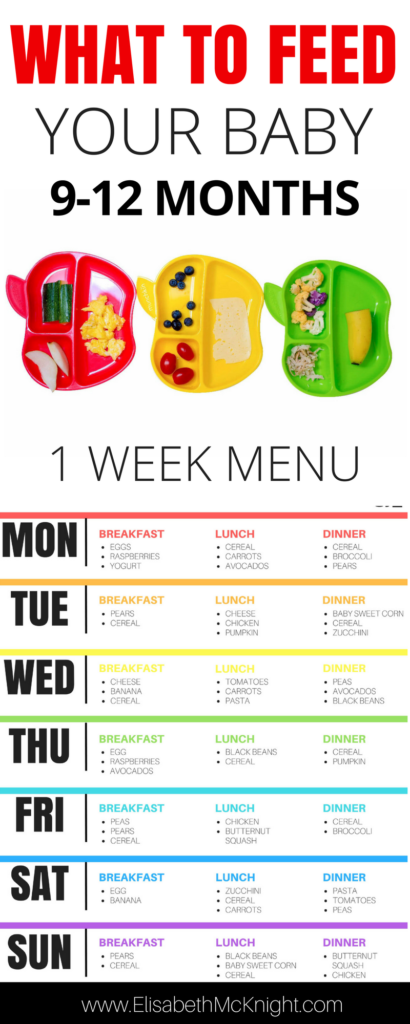 Sixth day
Sixth day | First breakfast | Breast milk or formula |
| Second breakfast | Rice porridge, half yolk (chicken egg) |
| Lunch | Vegetable soup with chicken breast, juice |
| Snack | Baked apple |
| Dinner | Spinach mashed potatoes |
| Second dinner | Breast milk or formula |
Seventh day
| First breakfast | Breast milk or formula |
| Second breakfast | Millet porridge, croutons |
| Lunch | Steamed chicken cutlets, vegetable puree |
| Snack | Apple juice |
| Dinner | Curd with fruits |
| Second dinner | Breast milk or formula |
Parents need to gradually accustom the child to eating solid foods, because now he is moving to a new level of development: more teeth appear, so the baby can now chew food.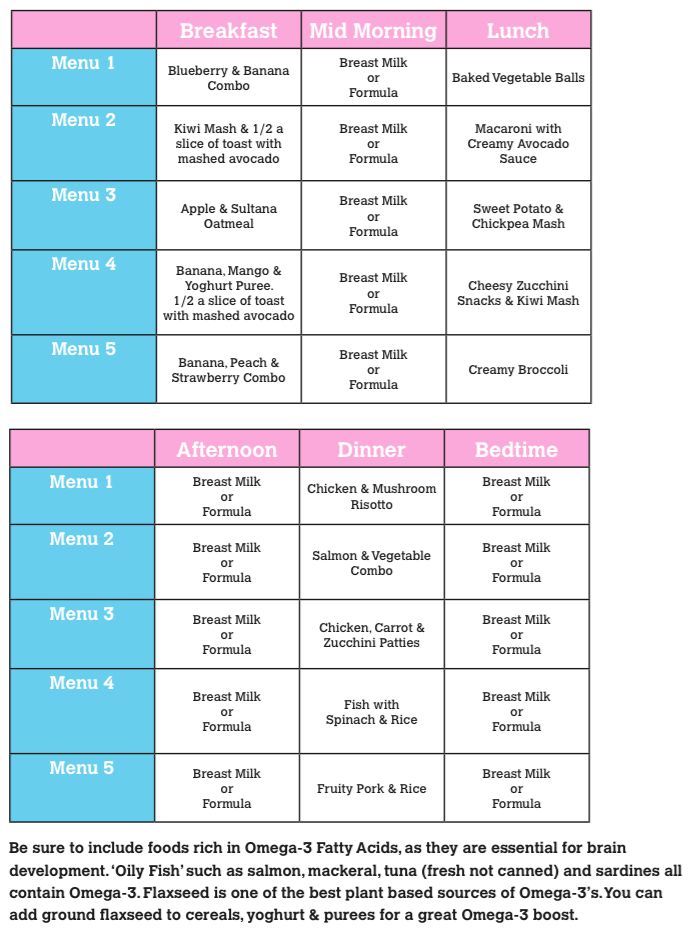 If this is not done in a timely manner, a baby may refuse solid food in a year. Changing the consistency of dishes favorably affects the development of the digestive system.
If this is not done in a timely manner, a baby may refuse solid food in a year. Changing the consistency of dishes favorably affects the development of the digestive system.
No need to grind fish and potatoes in a blender - just put the food on a plate and mash well with a fork. Meat can be offered in the form of meatballs to develop chewing skills. It can be turkey, rabbit, veal, beef, chicken. The norm of meat for one meal is 60-70 g.
It is quite normal if at first large pieces in a dish cause discontent in a child or even a gag reflex - he will soon get used to it. Sometimes it happens the other way around - the baby willingly tries the pieces, but refuses pureed food. Treat your baby with apple slices, bread, crackers or baby snacks. But the meat is still better to grind thoroughly.
At this age, consumption of mother's milk or adapted formula decreases. There are only two feedings per day - in the morning and in the evening. Everything else is "adult" food. Ideally, the baby should sleep through the night and get up at 06:00-07:00. If the little one wakes up at night, it is already possible to gradually wean him from feeding at night (provided that he is gaining weight normally). You can consult with your pediatrician about this.
Ideally, the baby should sleep through the night and get up at 06:00-07:00. If the little one wakes up at night, it is already possible to gradually wean him from feeding at night (provided that he is gaining weight normally). You can consult with your pediatrician about this.
Please note that uneaten food (already cooked) must not be stored and reheated. It is also not recommended to add sugar and salt to the dish.
If you give your child ready-made baby puree, we recommend that you do not feed him immediately from a jar, but pour the right amount onto a plate. In this case, the rest can be stored in the refrigerator for another 24 hours.
Find out more: Baby Portion
Pay attention to the quality of food you cook: appearance, smell and expiration date. It is better to use seasonal vegetables and fruits, and shop in trusted places.
Wash food thoroughly under running water before cooking. You can also use special children's products for washing fruits and vegetables.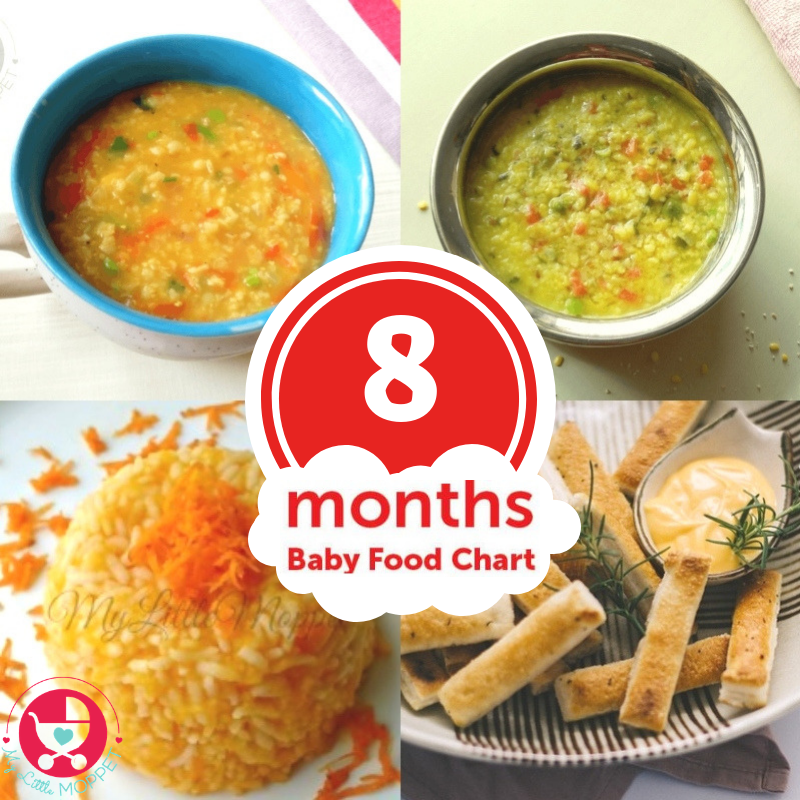
All products must be brought to full readiness, and then thoroughly crushed to the desired consistency, so that the baby can comfortably chew small pieces. After eating, wash the dishes with a special detergent.
How to properly feed a 9-month-old baby if he refuses food and does not eat the foods you suggest?
Poor appetite is one of the indicators of a baby's health. The problem may concern the digestive tract, glucose levels, central nervous system. The feeling of hunger appears when the level of sugar in the blood decreases. But for this you need to take breaks between meals. Also, the smell of food affects the appetite - it causes the release of gastric juice.
How to regain your appetite:
- observe the diet;
- develop a delicious menu for a baby at 9 months;
- Serve dishes beautifully and set the table;
- ventilate the room before eating;
- let your baby use cutlery.
See also: The baby does not eat well, how to feed?
In order for the baby to eat willingly, he must be in a good mood.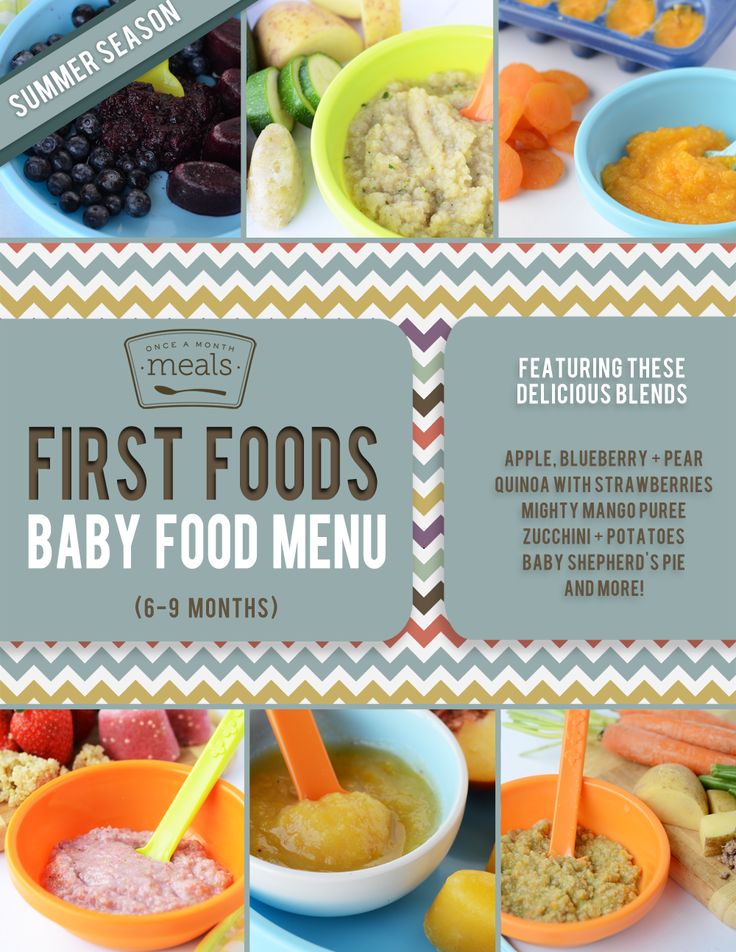 Try to avoid stressful and nervous situations, feed him in a calm, comfortable atmosphere.
Try to avoid stressful and nervous situations, feed him in a calm, comfortable atmosphere.
If the baby refuses to eat or eats very slowly, do not rush or force him to eat. Also, do not force the little one to eat foods that he refuses. Otherwise, in the future, he will have a negative attitude towards the feeding process, refuse to eat any food at all. He can even feel sick and vomit only with one kind of food.
Important
Games and cartoons during meals do not really improve appetite. On the contrary, in this way you only teach the baby to eat without noticing the dishes.
With the help of our tips, you can create a menu for a child at 9 months for every day, which will meet the requirements of a healthy diet and preferences of the baby
1. What should not be given to a child at 9 months?
It is not recommended to give cow's milk until the age of one. It contains too much calcium, which overloads the kidneys, and protein, which is poorly digested. Also be careful with foods that can cause allergies or contain a lot of sugar
Also be careful with foods that can cause allergies or contain a lot of sugar
2. Should oil be included in a baby's diet?
A 9-month-old baby's menu should include animal and vegetable oil, as it contains many vitamins, proteins and fatty acids necessary for the proper development of the baby. Among the useful products of plant origin, it is worth noting olive, corn, sesame or linseed oil.
3. Can a 9-month-old baby be given fish?
Low-fat white fish can be a healthy addition to your baby's menu. It is recommended to give fish 1-2 times a week instead of a meat dinner - flounder, cod, hake or pike perch are suitable. If the baby responds well to the product, try making fish cakes or meatballs.
Related Articles:
Cooking or using baby food?
At what age can a child be given kefir
Last reviews
Average customer rating
1 customer ratings
Snapshot of community ratings
- 5 one
- four 0
- 3 0
- 2 0
- one 0
Diet for a child aged 9-12 months
By 9 months the main complementary foods have already been introduced, so the expansion of the child's diet continues. It is important to know that at this age the consistency of the products should change from homogenized to finely and coarsely ground.
A meat dish for an older child can be offered in the form of meatballs, which diversifies the child's diet and stimulates the formation of chewing skills. Canned meat industrial production for children over 8 months. - coarsely chopped, spices and spices (white pepper, celery, parsley, dill, onion, basil, thyme) can be added to them.
The amount of fish puree increases to 60 g per day by 12 months. Fish is given 2 times a week boiled without broth (instead of meat).
At this age, children's pasta can be offered to the child.
The number of children's cookies and crackers is increased up to 10-15 g per day (2-3 cookies).
By the year it is useful to add finely chopped fresh garden greens (dill, parsley) to various dishes, which significantly enriches the diet with vitamins and minerals.
Sample diet for a 12 month old child:
| breakfast 8 hours | Dairy-free or milk porridge* Butter Boiled egg yolk Fruit puree | 150-200 g approx. 1/2 pcs 50 g |
| lunch 12 noon | Vegetable puree Vegetable oil Meat puree (meatballs) or fish Bread/rust Compote | 180 g |
| afternoon tea 4 pm | Breast milk (kefir or yogurt)** Cottage cheese Fruit puree Baby biscuits | 100 g 50 g 50-70 g 2 pcs |
| dinner 20 hours | Vegetables or porridge** Meat puree Vegetable oil Fruit juice | 180 g 20 g 1/2 tsp. 50 ml |
| before bedtime 11 pm | Breast milk (DMS)*** | 200 ml |
* - dairy-free porridge should be diluted with breast milk or infant formula that the child receives.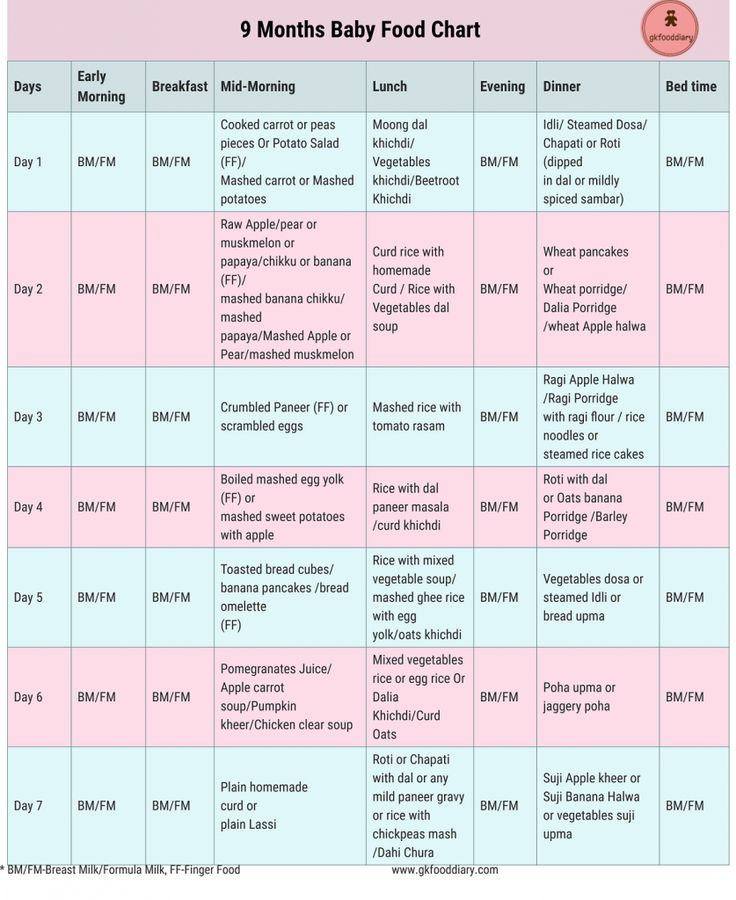 Milk porridge is diluted with water.
Milk porridge is diluted with water.
** - daily volume of kefir or yogurt can be up to 200 ml,
*** - baby milk formula
Approximate diet of a 12-month-old child with an allergy to cow's milk proteins:
| breakfast 8 hours | Dairy-free porridge* Vegetable oil Fruit puree | 150-200 g approx. 1 tsp. 50 g |
| lunch 12 noon | Vegetable puree Vegetable oil Meat puree/meatball Bread/crust Compote | 180 g about 1/2 tsp. 50-70 g 10 g 50 ml |
| afternoon tea 4 pm | Breast milk or medicated formula for infants with cow's milk protein intolerance Fruit puree Rusk | 150-180 ml |
| dinner 20 hours | Vegetables or dairy-free porridge** Vegetable oil Meat puree Fruit juice | 180 g about 1/2 tsp. 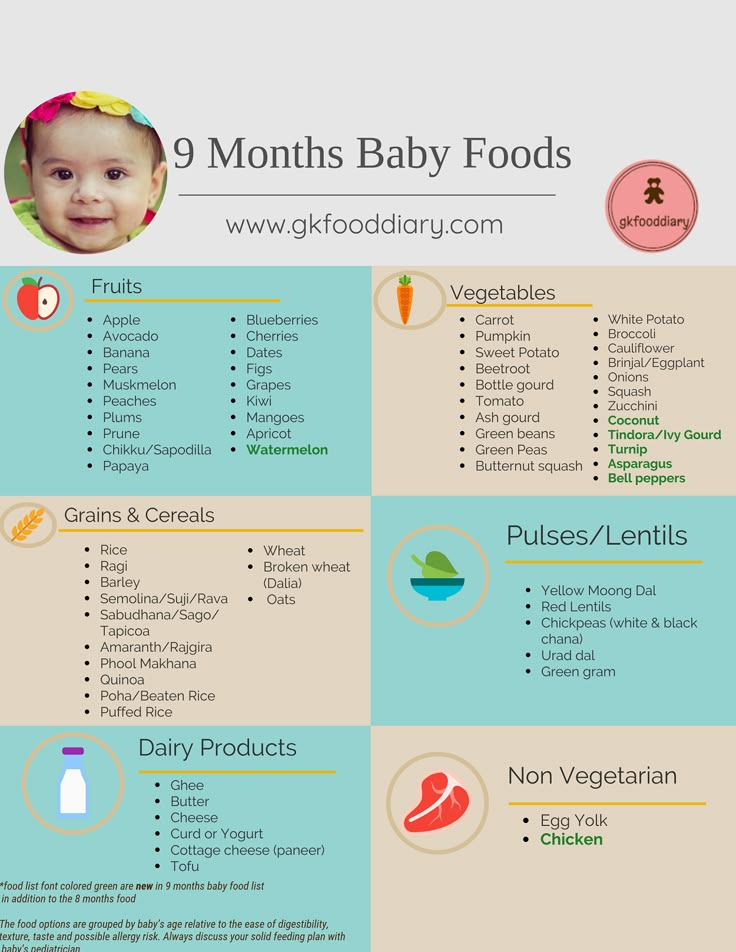 |


